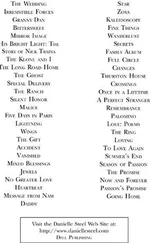Danielle Steel - Echoes
Здесь есть возможность читать онлайн «Danielle Steel - Echoes» весь текст электронной книги совершенно бесплатно (целиком полную версию без сокращений). В некоторых случаях можно слушать аудио, скачать через торрент в формате fb2 и присутствует краткое содержание. Год выпуска: 2005, ISBN: 2005, Издательство: Random House, Inc., Жанр: Старинная литература, на английском языке. Описание произведения, (предисловие) а так же отзывы посетителей доступны на портале библиотеки ЛибКат.
- Название:Echoes
- Автор:
- Издательство:Random House, Inc.
- Жанр:
- Год:2005
- ISBN:9780440240785
- Рейтинг книги:4 / 5. Голосов: 1
-
Избранное:Добавить в избранное
- Отзывы:
-
Ваша оценка:
- 80
- 1
- 2
- 3
- 4
- 5
Echoes: краткое содержание, описание и аннотация
Предлагаем к чтению аннотацию, описание, краткое содержание или предисловие (зависит от того, что написал сам автор книги «Echoes»). Если вы не нашли необходимую информацию о книге — напишите в комментариях, мы постараемся отыскать её.
Echoes — читать онлайн бесплатно полную книгу (весь текст) целиком
Ниже представлен текст книги, разбитый по страницам. Система сохранения места последней прочитанной страницы, позволяет с удобством читать онлайн бесплатно книгу «Echoes», без необходимости каждый раз заново искать на чём Вы остановились. Поставьте закладку, и сможете в любой момент перейти на страницу, на которой закончили чтение.
Интервал:
Закладка:
“More than likely, I'm afraid.” The priest looked grim. Catholics weren't entirely safe from Hitler either. He had no great fondness or respect for the Catholic Church. “We must pray for them.”
“I was wondering…do you suppose there's any way of learning what happened to them? Someone said they were deported. But they can't all have gone, at least not the women and children.”
“You never know,” the priest said quietly. “These are frightening times.”
“Well, I didn't want to cause you any trouble,” Beata said apologetically. “I just felt so badly when I heard now at the bank. If you hear anything, let me know.”
“What was their name?”
“Wittgenstein. Of the bank.” He nodded. Everyone in Cologne knew the name. It was a big statement if they had deported them. But anything was possible now. Kristallnacht had opened the doors of hell, and unleashed demons beyond anyone's worst fears. The inhumanity of man in its most shocking form and colors.
“I'll let you know. I know a priest in that parish. He may have heard something, even though they're Jewish. Eventually these things get around. People see. Even if they're afraid to talk.” Everyone was afraid now. Even Catholics. “Be careful,” he admonished her as she got ready to leave. “Don't try to go there yourself.” He knew she was a kind-hearted widow with a young child, and might try to do something foolish. And she had a special place in his heart because of Amadea. The mother of a Carmelite could only be a good woman, and he knew she was.
It was the last week of November when he stopped her on her way out of church. Daphne was distracted talking to a friend. And Beata had written nothing to Amadea about her concerns.
“You were right,” the priest said quietly as he fell into step beside her. “They're all gone.”
“Who?” she asked, looking distracted. She remembered asking him, but he was being so mysterious that she wasn't sure if this was her answer, or if he was talking about something else.
“The family you asked about. They took all of them. The next day. The entire family. Apparently the man who owned the bank had a daughter and two sons, and another daughter who died years ago. My friend knew him well. He saw him walking in the neighborhood quite often, and he would stop to talk. He said he was a nice man. A widower. They took them all. The widower, the children, even the grandchildren. He thinks they were sent to Dachau, but there's no way to know. In any case, they're gone. The house will be given to an officer of the Reich most likely. I'll say a prayer for them,” he said, and then moved on. There were a lot of stories like that these days. Beata felt as though she was in shock, and said not a word to Daphne as they walked home.
“Are you all right, Mama?” she asked quietly. Her mother seemed very nervous these days, but everyone was. Several children had been taken out of her school, and everyone had cried. The teacher had scolded them for it and said they were only Jews, and didn't deserve to go to school, which Daphne thought was very rude, and sick. Everyone deserved to go to school. Or at least that was what her mother said. “Is something wrong?”
“No, I'm fine,” she said tersely, suddenly grateful for what the priest had said, that Jacob Wittgenstein had had a daughter who died years ago. With any luck at all, the world would assume she was dead. So far, no one had bothered them at all. She was a Catholic widow, with one young daughter, and another who was a nun. Thank God for Antoine. “I just heard a sad story about a family I knew who got deported after Kristallnacht,” she said softly. Her entire family was gone. Her father, brothers, sister, their children, her brothers' wives. Gone. It was beyond belief. God only knew where they were and if they would survive. One heard horror stories about the camps. They were supposed to be work camps, but many died. And her father was not young. He was seventy-three years old. Her mother would have been sixty-eight, and Beata was suddenly grateful that she had been spared that. At least she had died in peace, even if Beata wasn't there to comfort her at the end. Even now, she had no malice against her father. What had just happened was far worse than anything she could have done, and not what any of them had deserved. No one did. And she was frightened herself. But for now, they were safe. She was sure of that.
“How awful,” Daphne said quietly, thinking of what her mother had said.
“Don't say that to anyone,” Beata snapped at her. “If you're sympathetic to the Jews, they'll hurt you,” she said as they walked into the privacy of their own home. It was warm and comfortable and safe. That was essential now. She couldn't get the vision of the destroyed facade of her old home out of her head, the broken windows, and the antiques strewn all over the street.
“But you feel sorry for the Jews, don't you, Mama?” Daphne looked at her with innocent eyes.
“Yes,” Beata said honestly, “but it's dangerous to say that out loud these days. Look what just happened. People are angry and confused. They don't know what they're doing. It's better to keep quiet. I want you to remember that, Daphne.” Her mother looked at her sternly, and she nodded sadly.
“I will. I promise.” But it seemed so mean. It all did. So cruel. And so wrong. She couldn't help thinking how frightening it would be to be Jewish. To lose your home. To have people take you away, or maybe even lose your parents. It made her shudder to think about it. She was glad that she and her mother were safe. Even if she didn't have a father near at hand. But no one was going to bother them.
They were both quiet that night, lost in their own thoughts. And Daphne was startled when she walked into her mother's room and found her on her knees praying. She looked at her for a minute and then walked out of the room. She wondered if her mother was praying for the family she had talked about that afternoon, and suspected that she was. She was right. But Daphne had no idea what she was doing. She was doing what she had never done, and heard her father do. What they had done for her. What Orthodox women never did. She was saying Kaddish, the prayers for the dead. And praying that they were still alive. But if not, someone had to do it. She said all that she could remember, and then knelt there, by the side of her bed, with tears running down her cheeks. They had closed their doors to her years before, and their hearts, and had declared her dead. But she loved them anyway. And now they were gone, all of them. Brigitte, Ulm, Horst, Papa. The people she had grown up with and never ceased to love. She sat shiva for them that night, just as long before, they had done for her.
13
BEATA CALLED THE MOTHER SUPERIOR IN THE FIRST WEEK of December and asked to visit her daughter. She said it was important, and the Mother Superior told her gently that she would have to wait. They were very busy these days. In fact, they had deep concerns, and a problem of their own. She gave Beata a visiting time on December 15, hoping things would have calmed down by then.
Beata was beside herself till then. She didn't know why, but she felt compelled to see Amadea and tell her what had happened. It didn't really affect them, but it could. She had to know. She had that right. She would have told Daphne, too, but she was too young, and she might say something in school. She was not yet fourteen, and too young to be burdened with deep secrets. Particularly secrets that could cost lives, even her own. But at least Amadea was safe where she was, and her mother valued her advice. She didn't want to make these decisions alone. She had been thinking of going to Switzerland. But Antoine's cousins were long dead. And there was nowhere else to go. She would have had to rent a house there and leave her own. She hated to make decisions out of panic and fear. There was no reason for her to be afraid, but she was. Deeply afraid.
Читать дальшеИнтервал:
Закладка:
Похожие книги на «Echoes»
Представляем Вашему вниманию похожие книги на «Echoes» списком для выбора. Мы отобрали схожую по названию и смыслу литературу в надежде предоставить читателям больше вариантов отыскать новые, интересные, ещё непрочитанные произведения.
Обсуждение, отзывы о книге «Echoes» и просто собственные мнения читателей. Оставьте ваши комментарии, напишите, что Вы думаете о произведении, его смысле или главных героях. Укажите что конкретно понравилось, а что нет, и почему Вы так считаете.











